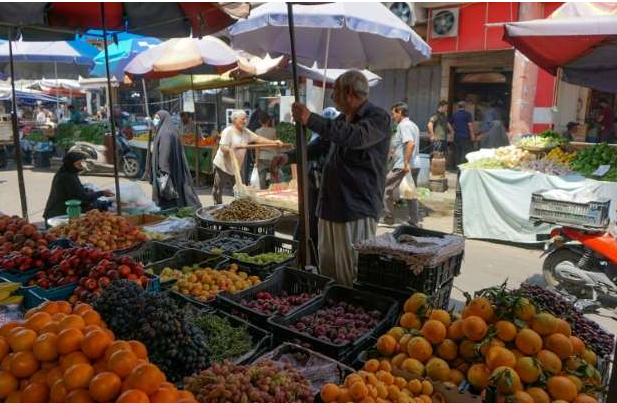

Unlike in years past, Iraqi farmer Ahmed Mohsen now walks past his local market with a smile on his face. The pale green melons he harvested are selling fast, thanks to the coronavirus pandemic.
Iraq, in a bid to prevent the spread of the deadly COVID-19 pandemic, shut its 32 border crossings to goods and people coming from Iran, Turkey, Syria, Jordan and Saudi Arabia in mid-March.
That helped Iraq’s agriculture ministry accelerate a campaign to make Iraqi food markets self-sustainable, after they had spent years relying on foreign imports for half of their supply.
The land fit for farming in Iraq is roughly 9.3 million hectares (23 million acres) — much less than Iran’s nearly 46 million or Syria’s almost 14 million hectares.
“For years, farmers have been working at a loss with little support from the state,” said Mohsen, who lives in Iraq’s agricultural heartland, the southern province of Diwaniyah.
“But with the new coronavirus, the authorities have begrudgingly been forced to close the border.”
Every year, Iraq would buy $2.8 billion in goods from regional trade giant Turkey, with Iranian imports coming in second with $2.2 billion in products sold to Baghdad.
It was a grim reality for a country whose ancestral civilisation, Mesopotamia, has been hailed for its pioneering agricultural and irrigation technologies for thousands of years.
The land of two rivers is now making a small comeback. Every day, Mohsen’s melons make their way from his home village of Afak to be sold en masse to the rest of the country.
“The authorities didn’t want to help farmers, but in the end they allowed us to prove that we can provide for the nutrition needs of Iraqis,” said Mohsen, a 32-year-old farming engineer.
– ‘The state is late’ –
A third of Iraq’s 40 million people still rely on farming to live, but the industry is riddled with inefficiencies.
As a holdover from the socialist era of ex-dictator Saddam Hussein, the government provides subsidies in water, fertiliser and equipment and purchases certain products — particularly wheat, barley and lentils — from Iraqi farmers at a price above the market rate.
But the state usually also imports cheap foodstuffs from Iran and Turkey at huge volume, causing an imbalance in the market, experts wrote in the “Sustainability” environmental magazine last year.
Their research found that Iraqi farmers often opted not to work their land because they did not expect to sell the harvest, given the oversupply from neighbouring countries.
Local farmers usually provide about five million tonnes of wheat products yearly, complemented by around three million tonnes imported from neighbouring countries, mostly flour.
Those who did sell their harvest to the government reported months-long delays in getting paid, which are still ongoing today.